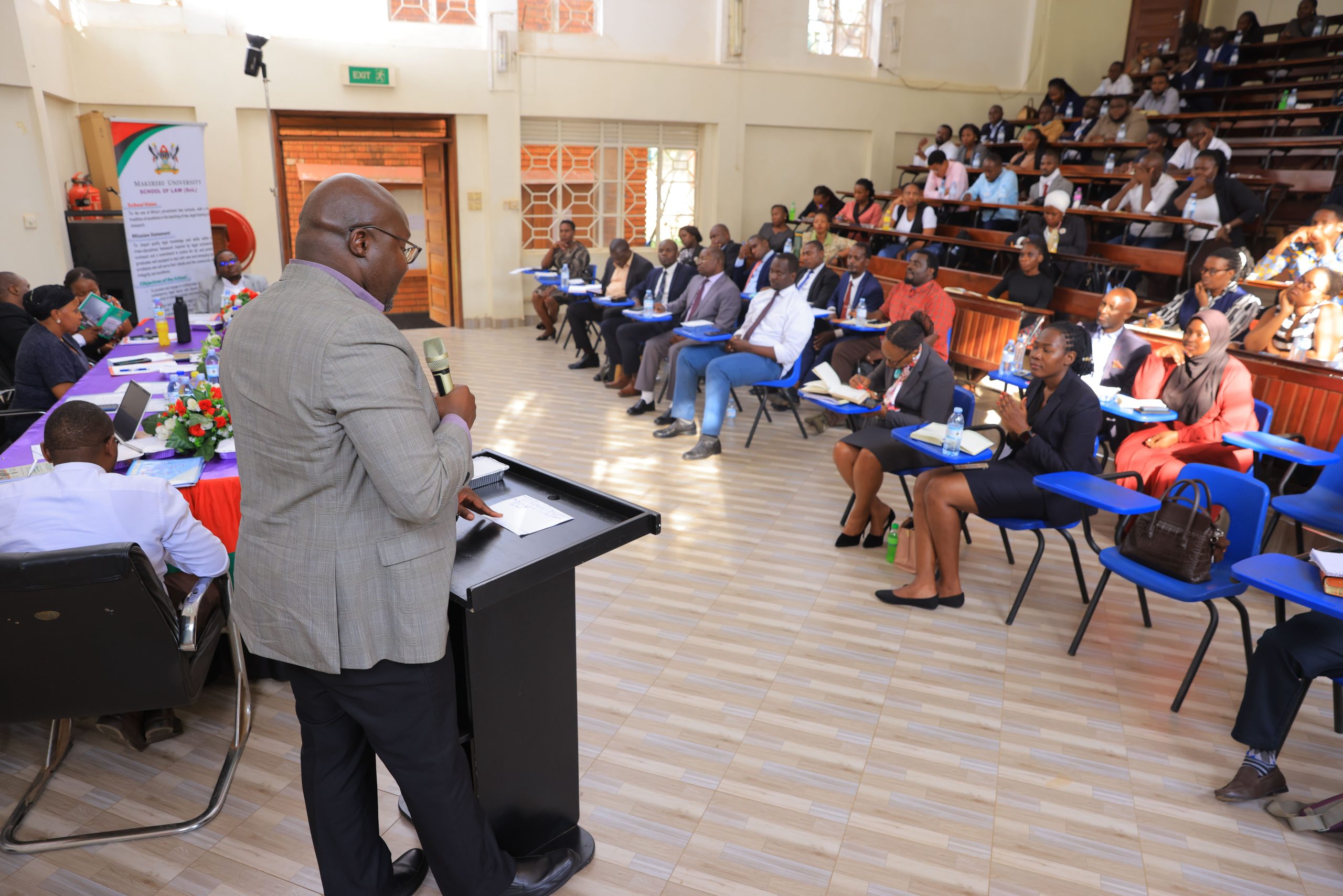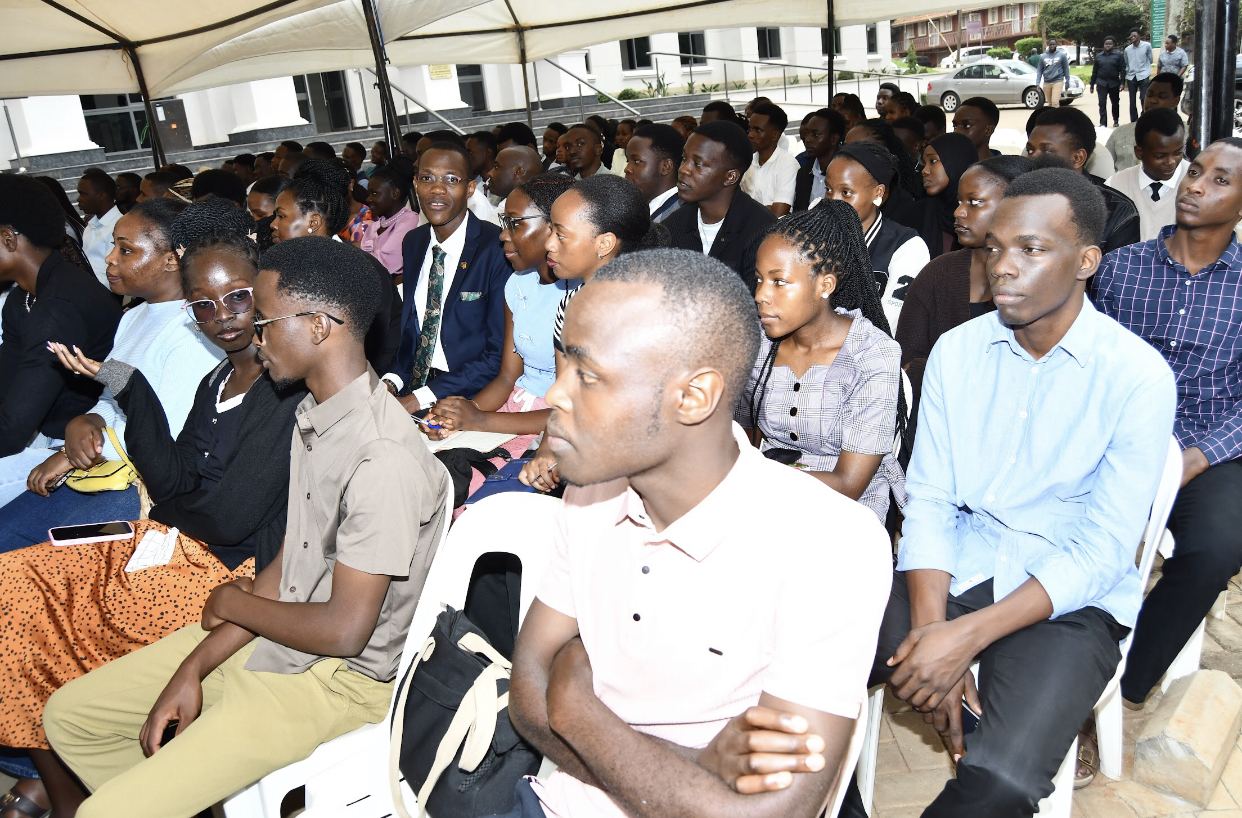Launch of Disability Law And Rights Centre (DLRC)
The School of Law officially launched the Disability Law and Rights Centre Wednesday 29th January 2020 at a ceremony attended by the Academia, Law students, and a number of stakeholders in the Disability movement in the country
The Launch comes after a process started in 2015 where the School of Law, with support from the Open Society Fund, progressively embarked on a process of putting disability rights issues at the center of its core activities and what started off as a project evolved to become a center in 2019.

The Chief Guest at the event Mrs. Sylvia Muwebwa Ntambi, Chairperson Equal opportunities Commission said the EOC was delighted to be part of the launch of the Disability Law and Rights Centre (DLRC), of the School of Law, Makerere University, which she said would help advance the rights of persons with disabilities who continue to be a marginalized group in Uganda.
She observed that historically both at the domestic and international level, persons with disabilities were treated as subjects of pity and sympathy, deserving of charity. In the home setting and broader community, persons with disabilities were considered unable to participate in the private or public sphere; incapable of making decisions such as participating in political life, contracting a marriage or having a family, deciding where and with whom to live or even make simple choices such as what to eat or dress.

She said this scenario was progressively improving in de jury terms with the legal and policy framework at the national and international level rapidly recognizing disability rights.
Mrs Muwebwa explained that the 1995 Constitution recognizes rights of persons with disabilities and obliges the State to make Laws for the protection of these rights. She illustrated that as a result, specific Laws such as the Equal Opportunities Act, 2007, the Persons with Disabilities Act of 2019 and the National Council of Disability (as amended in 2013) the Mental Health Act among others were passed with legal Provisions designed to promote rights of persons with disabilities.She also cited some mainstream laws such as the Control of Building Act (2013) that incorporated positive Provisions on rights of persons with disabilities.
She however regretted to note that despite the fact a number of awareness campaigns had been held emphasizing that Persons with Disabilities are people just like other human beings, stereo types still exist.
Mrs Muwebwa emphasized the need for all to realize that a PWD could do what any other person can, except that they had certain health and other challenges which once addressed through universal designs and reasonable accommodation measures made it possible for them to participate in society.

On the subject of research, which is one of the core outputs of the Disability Law and Rights centre, the EOC chairperson noted that this was an important tool to employ towards taking disability rights forward. She asked the center to undertake the disability rights research in partnership with organizations of persons with disabilities, and to be cognizant of the multiple identities of persons with disabilities. She expressed optimism that the centre would contribute towards dispelling the negative myths and practices concerning PWDs through research and awareness interventions, collaborations and strategic partnerships with various key players in society.
In his remarks, the First Deputy Vice chancellor in charge of Academic Affairs Dr. Umar Kakumba commended the School of law for this and other initiatives which he said, help in building the brand of Makerere University. He commended the School of Law for its efforts in helping the University get away for the Ivory tower mentality through programs that help address the needs of the communities.
Dr. Kakumba shared his experience drawn from the University of Galloway in Ireland, where he interfaced with a number of scholars and scholarly works in the field of Disability Law and Rights during a benchmarkingexercised he conducted with team from School of Law. He said he was proud to be associated with the Disability Law and Rights Centre which would help add value to the University through research and developing strategic partnerships which wasone of the pillars of the Universities Strategic plan 2020-2030. ‘The Centre is a pivot around which the research output will rotate. The center will be a platform to spearhead new research’, he observed.
The DVC (AA) noted that the direction of the University was to undertake more of postgraduate studies and research in specialized areas having built enough capacity for other Universities to take on undergraduate programs. “The legal minds in the School of Law can provide a lot in specialized areas like Disability Law, taxation, offer consultancies, and give counsel in areas like the East Africa community integration among other areas. He added.
The Ag. Principal Dr. Christopher Mbazira said the School of Law had made strides in facilitating changes in the teaching and learning methodologies with the purpose of promoting community led approaches. He said this was demonstrated through activities in units like the Disability Law and Rights Centre, The Human Rights and Peace Centre, the Public Interest Law Clinic among others. He said the School of Law was bringing the communities on board through knowledge transfer as well as drawing lessons from their experiences.
Mbazira said the School of Law in line with the global trends had progressively changed the way law is taught from case law style method of teaching which was found ineffective in training Lawyers with the requisite skills to address issues in society. He said through experiential learning and clinical methodologies, the desired changes had been realized over time.
While addressing himself on the subject of Disability law and Rights, Dr. Mbazira said the School of Law took lead in the teaching of students with Disabilities. He paid special tribute to the Late Muhumuza Boaz and Medi Sengoba both alumni with Visual and physical impairments that brought on table the idea of the centre and sourced for the initial funding. He however expressed some of the challenges constraining the growth of the center that include payment for staff as well as physical space.
Ms. Atim Patricia on behalf of the Coordinator of the center Dr. Damalie Naggita Musoke gave some background about the centre. She said the centre was established in 2015 with the task of developing a Disability Law and Rights Module following which a curriculum was developed. She said academic and administrative staff was trained to create consciousness about issues of disability while handling students and other clientele that seek service from the University. She reported that a number Research and Advocacy works had been completed as well as strengthening partnerships with other Law teaching Universities that were identified as key in realizing the vision of the centre



